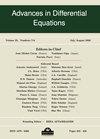双曲空间上的非线性热方程:整体存在性和有限时间爆破
IF 1.5
3区 数学
Q1 MATHEMATICS
引用次数: 0
摘要
我们研究了双曲空间上半线性热方程的柯西问题:\begin{align}\label{abs:eqn} \left\{\begin{array}{ll} \partial_{t}u=\Delta_{\mathbb{H}^{n}} u+ f(u, t)&\hbox{ in }~ \mathbb{H}^{n}\times (0, T),\\ \\ \quad u =u_{0}&\hbox{ in }~ \mathbb{H}^{n}\times \{0\}. \end{array}\right. \end{align}对于属于$C(\mathbb{H}^{n}) \cap L^{\infty}(\mathbb{H}^{n})$的非负初始数据$u_0$和形式$f(u,t) = h(t)g(u).$的$f$的不同选择,我们研究了Fujita现象。众所周知,对于$u,$中的幂非线性,幂权$h(t) = t^q$是次临界的,因为对于小初始数据存在非负全局解。另一方面,对于指数权$h(t) = e^{\mu t},$,它表现出Fujita现象,即存在一个临界指数$\mu^*$,如果$\mu>\mu^*$则所有非负解在有限时间内爆炸,如果$\mu \leq \mu^*$存在小初始数据的非负全局解。本文的主要目标之一是在$u$中找到一个适当的非线性,以便上面提到的具有功率权重$h(t) = t^q$的柯西问题确实表现出藤田现象。在本文的剩余部分,我们研究了$u.$中指数非线性的Fujita现象,并进一步将这些结果推广到Cartan-Hadamard流形。本文章由计算机程序翻译,如有差异,请以英文原文为准。
Non-linear heat equation on the Hyperbolic space: Global existence and finite-time Blow-up
We consider the following Cauchy problem for the semi linear heat equation on the hyperbolic space: \begin{align}\label{abs:eqn} \left\{\begin{array}{ll} \partial_{t}u=\Delta_{\mathbb{H}^{n}} u+ f(u, t)&\hbox{ in }~ \mathbb{H}^{n}\times (0, T),\\ \\ \quad u =u_{0}&\hbox{ in }~ \mathbb{H}^{n}\times \{0\}. \end{array}\right. \end{align} We study Fujita phenomena for the non-negative initial data $u_0$ belonging to $C(\mathbb{H}^{n}) \cap L^{\infty}(\mathbb{H}^{n})$ and for different choices of $f$ of the form $f(u,t) = h(t)g(u).$ It is well-known that for power nonlinearities in $u,$ the power weight $h(t) = t^q$ is sub-critical in the sense that non-negative global solutions exist for small initial data. On the other hand, it exhibits Fujita phenomena for the exponential weight $h(t) = e^{\mu t},$ i.e. there exists a critical exponent $\mu^*$ such that if $\mu>\mu^*$ then all non-negative solutions blow-up in finite time and if $\mu \leq \mu^*$ there exists non-negative global solutions for small initial data. One of the main objectives of this article is to find an appropriate nonlinearity in $u$ so that the above mentioned Cauchy problem with the power weight $h(t) = t^q$ does exhibit Fujita phenomena. In the remaining part of this article, we study Fujita phenomena for exponential nonlinearity in $u.$ We further generalize some of these results to Cartan-Hadamard manifolds.
求助全文
通过发布文献求助,成功后即可免费获取论文全文。
去求助
来源期刊

Advances in Differential Equations
MATHEMATICS, APPLIED-MATHEMATICS
CiteScore
1.90
自引率
0.00%
发文量
0
审稿时长
>12 weeks
期刊介绍:
Advances in Differential Equations will publish carefully selected, longer research papers on mathematical aspects of differential equations and on applications of the mathematical theory to issues arising in the sciences and in engineering. Papers submitted to this journal should be correct, new and non-trivial. Emphasis will be placed on papers that are judged to be specially timely, and of interest to a substantial number of mathematicians working in this area.
 求助内容:
求助内容: 应助结果提醒方式:
应助结果提醒方式:


